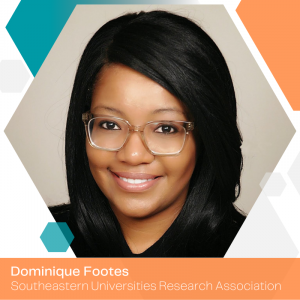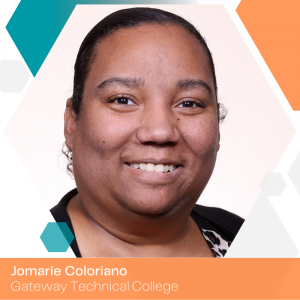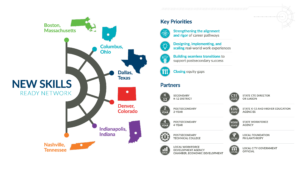February 1 marks the start of Career Technical Education (CTE) Month, a national celebration of the impact of CTE on learners, families, educators, our workforce and our communities. It is a critical opportunity to conduct communications and outreach to introduce CTE to audiences who may not be aware of it or may have historical stigmas about its value. In doing so, you can cultivate more diverse interest in your programs and cultivate new CTE champions.
We asked states what they already have planned, and these were some of their responses.

Here are five tips to help you push the limits and maximize your CTE Month Activities to create impact not just in February but all year long:
Tip 1: Use Your Activities to Tell A Story
Your CTE Month activities should be designed to advance your top legislative, strategic plan and programmatic goals. Consider who is invited to your events, who is featured as speakers and what materials should be shared. Combine your top quantitative outcomes with impactful stories from CTE stakeholders to proactively address stigmas or opposition to your goals and reach audiences needed to advance these goals.
Tip 2: Choose Impact over Quantity
We know staff capacity is limited. Therefore, it is important that work invested in your CTE Month events and activities are not done just only of tradition, but also because they are impactful in advancing goals and reaching your target audience.
Here are some questions to ask: What audiences do you need to reach during CTE Month? Do your current activities equitably reach those audiences? Do your activities reach new audiences?
Tip 3: Be Intentional About Who You Spotlight
Equity and access should be embedded in all CTE Month activities. Consider whether the visual representation, wording used, languages and formats allow your intended audiences to fully know about and participate in the activities.
Additionally, consider whether all audiences are represented in your events, and if there are specific voices you need to add to your table. Perhaps you have an event for all employers, but are there employers with internship or placement programs supporting special populations that you should target to connect to current work? would it be more impactful to engage specifically with employers with existing programs to support learners transitioning out of foster care or learners with disabilities?
Tip 4: Activate your CTE Champions
You don’t have to do all CTE Month activities yourself! Consider how your existing champions across policymakers, educators, employers, etc. can hold their own events, leverage existing events to highlight CTE, and/or make introductions to bring new CTE champions to the table. This is particularly important to closing representation gaps in your programs or garnering support for legislative or policy initiatives.
Tip 5: Make CTE Month Year Round!
Make sure your events aren’t a one-time impact! If some of these tips are causing you to reevaluate your current activities, consider if there are adjustments or new events that can be held throughout the remainder of 2024 to make CTE a larger story that builds toward advancing your goals and initiatives.
Use Advance CTE’s communication and advocacy resources to reach families, employers and policymakers:
- Core Messages for Attracting Learners to CTE
- Digital graphics and print templates
- Fact Sheet and Key Messages: Communicating the Value of CTE to Employers
- Resources to Engage with Policymakers
Stacy Whitehouse, Communications Manager


 Last month, Advance CTE hosted the National Summit on Advancing Postsecondary CTE Data Quality & Use (Summit). The convening was the capstone of a two-year initiative, supported by ECMC Foundation, to support leaders in five states in cultivating postsecondary data ecosystems that assist institutions in offering career pathways that meet learner interests and are aligned to good careers. This post shares some of the main takeaways and themes from the Summit.
Last month, Advance CTE hosted the National Summit on Advancing Postsecondary CTE Data Quality & Use (Summit). The convening was the capstone of a two-year initiative, supported by ECMC Foundation, to support leaders in five states in cultivating postsecondary data ecosystems that assist institutions in offering career pathways that meet learner interests and are aligned to good careers. This post shares some of the main takeaways and themes from the Summit. The Summit also celebrated high-quality data system achievements outside of the PDI cohort. The first plenary featured a panel of Anna Fontus, Program Officer, ECMC Foundation; Su Jin Jez, Executive Director, California Competes; and Paige Kowalski, Executive Vice President, Data Quality Campaign. The panelists spoke on effective strategies to build support for California’s P20 Cradle-to-Career Data System, including:
The Summit also celebrated high-quality data system achievements outside of the PDI cohort. The first plenary featured a panel of Anna Fontus, Program Officer, ECMC Foundation; Su Jin Jez, Executive Director, California Competes; and Paige Kowalski, Executive Vice President, Data Quality Campaign. The panelists spoke on effective strategies to build support for California’s P20 Cradle-to-Career Data System, including: The second plenary session was delivered by Delaware’s State CTE Director, Jonathan Wickert. Jon spoke to the change management that enabled major shifts in the state’s postsecondary CTE data practices and system. At the center, Delaware prioritized building buy-in among staff and institution-level leaders and practitioners through many rounds of listening and feedback sessions. The state put itself in the seat of convener and let its stakeholders guide the principles and questions that would be addressed by new data routines and system requirements. This work resulted in a shared mission statement, principles and research agenda that ensures stakeholders and users needs are met by data system improvements.
The second plenary session was delivered by Delaware’s State CTE Director, Jonathan Wickert. Jon spoke to the change management that enabled major shifts in the state’s postsecondary CTE data practices and system. At the center, Delaware prioritized building buy-in among staff and institution-level leaders and practitioners through many rounds of listening and feedback sessions. The state put itself in the seat of convener and let its stakeholders guide the principles and questions that would be addressed by new data routines and system requirements. This work resulted in a shared mission statement, principles and research agenda that ensures stakeholders and users needs are met by data system improvements. 

 Davil Jackson (California) is passionate about empowering youth and young adult learners and has si
Davil Jackson (California) is passionate about empowering youth and young adult learners and has si My name is Sonia Slone and I am truly excited to join the Advance CTE Team! In my capacity as the Director of Operations, I will ensure that Advance CTE has the operational and financial management systems, organizational processes, policies, and infrastructure needed to support the team, members and Career Technical Education (CTE) community. I am particularly enthusiastic to ensure all processes and procedures are in line with Advance CTE’s commitment to diversity, equity and inclusion.
My name is Sonia Slone and I am truly excited to join the Advance CTE Team! In my capacity as the Director of Operations, I will ensure that Advance CTE has the operational and financial management systems, organizational processes, policies, and infrastructure needed to support the team, members and Career Technical Education (CTE) community. I am particularly enthusiastic to ensure all processes and procedures are in line with Advance CTE’s commitment to diversity, equity and inclusion. Kayla Brossett, Louisiana
Kayla Brossett, Louisiana Jomarie Coloriano, Wisconsin
Jomarie Coloriano, Wisconsin 



 To inform this campaign, ECMC Group has conducted five national surveys
To inform this campaign, ECMC Group has conducted five national surveys Over half of survey responses indicated that learners view skills-based education programs (e.g nursing, STEM, trade skills, etc) as an intelligent choice in today’s labor market despite reporting a limited knowledge of CTE programs. Survey responses also showed a
Over half of survey responses indicated that learners view skills-based education programs (e.g nursing, STEM, trade skills, etc) as an intelligent choice in today’s labor market despite reporting a limited knowledge of CTE programs. Survey responses also showed a  At their core, educational systems should work toward career readiness. Education should impart the skills and knowledge needed for learners to earn a living wage and become successful contributors to society.
At their core, educational systems should work toward career readiness. Education should impart the skills and knowledge needed for learners to earn a living wage and become successful contributors to society.  In the next decade, job seekers in manufacturing will find plenty of openings. It’s projected that nearly 3.5 million manufacturing jobs will need to be filled in the next 10 years. The challenge, however, is that there aren’t enough qualified workers to fill the positions. An aging workforce, changing technologies, and misperceptions about the industry all contribute to the shortage. This has serious consequences for the manufacturing industry, which is overwhelmingly not prepared. In fact, nearly nine out of 10 manufacturers say that their company is having problems finding skilled workers in manufacturing.
In the next decade, job seekers in manufacturing will find plenty of openings. It’s projected that nearly 3.5 million manufacturing jobs will need to be filled in the next 10 years. The challenge, however, is that there aren’t enough qualified workers to fill the positions. An aging workforce, changing technologies, and misperceptions about the industry all contribute to the shortage. This has serious consequences for the manufacturing industry, which is overwhelmingly not prepared. In fact, nearly nine out of 10 manufacturers say that their company is having problems finding skilled workers in manufacturing.